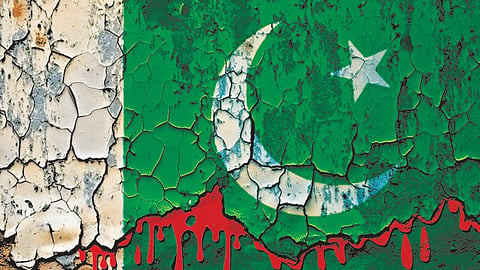

Pakistan has, over decades of malfeasance, inexorably surrounded itself with enemies. The use of terrorist proxies against each of its principal neighbours – India, Afghanistan and Iran – has all three powers arrayed against it, at a time when the country faces perhaps the worst economic crisis of its history.
A dubious election, moreover, cannot resolve the rolling political crises confronting Islamabad – with the country’s most popular politician, Imran Khan, jailed and disbarred from participating in the elections, purportedly on grounds of corruption, after a series of manoeuvres by the Army to ensure that a pliant proxy is installed in power. The role of the courts in this process, disgraceful as it has been, is far from unprecedented in the country.
After a decade of steady consolidation, Pakistan had brought terrorism-linked fatalities in the country down from a peak of 11,317 in 2009, to a low of 319 in 2019, the lowest tally since 2005 (SATP data). But the vicious, two-faced meddling in Afghanistan had ensured that the Taliban, who Rawalpindi thought it would establish as its proxy in Kabul, harbours a deep hatred against its Machiavellian neighbour.
As the Taliban gained ground in Afghanistan, particularly after the Doha Accord of February 2020, and finally after its seizure of Kabul on August 15, 2021, terrorist formations based along the AfPak border escalated their attacks on Pakistani soil – the Tehreek-e-Taliban Pakistan with evident support from the Taliban regime, and the Islamic State–Khorasan Province operating under the ambiguity of Afghanistan’s troubled border regions.
Crucially, Kabul’s hostility towards Islamabad is irreducible, since no Afghan government has ever accepted the British-inflicted Durand Line as the permanent border with Pakistan. The present Taliban regime – as with a succession of its predecessors – claims Pashtun dominated Khyber Pakhtunkhwa and Balochistan as integral parts of Afghanistan, setting it on a course of relentless confrontation with Pakistan.
The remnants of history also combine with more recent malice to set the stage for enduring conflict with Iran. The historical Balochistan region straddles parts of Afghanistan, Pakistan and Iran, and there has been an incipient Baloch separatist movement in Iran’s Sistan and Baluchistan Province as well, to which Teheran is very sensitive. Crucially, moreover, a radicalised, Sunni-dominated Pakistan and a radicalised, Shia-dominated Iran, are ensnared in deep and long-established mutual loathing. This has resulted in a protracted history of proxy terrorism by both Tehran and Islamabad.
In the most recent flareup, on January 16, 2024, Iran’s Revolutionary Guards launched precision and drone strikes on strongholds of the Jaish ul-Adl in Pakistan’s Balochistan province, killing two children. The strikes were purportedly in response to an attack on December 13, 2023, by Jaish ul-Adl, on a Police Station in Rask in the Sistan and Baluchestan Province, in which 11 police personnel were killed. Jaish ul-Adl is a Sunni terrorist formation operating out of Pakistan, which came into existence in 2012, and is proscribed by Iran. In response to the January 16 strikes, Pakistan carried out an air attack in the Sistan and Baluchestan Province on January 18, targeting alleged hideouts of the separatist Balochistan Liberation Front and Balochistan Liberation Army.
The trajectory of Pakistan’s proxy wars in India does not bear repetition here, but the reality is that Islamabad’s malevolence has left it with not a single friend among its neighbours. Significantly, even as Pakistan-backed terrorist movements in India teeter on the brink of collapse, between 2020 and January 2024, at least 20 India-directed terrorists have been killed in their safe havens in Pakistan.
Most of these killings are likely the result of increasing differences within the groups operating from Pakistani soil, and there is a strong likelihood of a surge in such killings as the security situation deteriorates. Some of these killings are being attributed to Indian intelligence agencies, but no evidence is forthcoming, as Pakistan denies even the presence of the victims on its soil. In any event, if there is even a little truth in these allegations, this can only be a source of greater concern for the Rawalpindi establishment.
The blatantly rigged elections of February 8 – engineered to install a Prime Minister and party in government that would not challenge the Army’s unquestioned writ – demonstrate that nothing has changed in the thinking of those who define and design the country’s policies and future. Inevitably, ‘more of the same’ can only drive Pakistan deeper into the morass of its malignant past and calamitous present. Unreformed and unrepentant, “the Army that has a country” continues to do the same thing over and over again, and expects the outcome to be different.
Ajai Sahni
Executive Director, Institute for Conflict Management, South Asia Terrorism Portal
ajaisahni@gmail.com